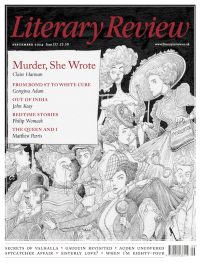Fiona Sampson
Tell Me the Truth About Love
The Island: W H Auden and the Last of Englishness
By Nicholas Jenkins
Faber & Faber 768pp £25
It takes a brave writer to tackle once more the monumental figure of W H Auden. Any new book appears against the background of John Fuller’s exhaustive literary and bibliographical work on the poet, and the mighty biographies written by Auden’s literary executor, Edward Mendelson. It must therefore offer something different from either of these great projects: an introduction for the intelligent general reader, perhaps, or idiosyncratic reflection.
Nicholas Jenkins’s The Island is neither of these. This substantial hardback is handsome in the usual Faber way. Its eight broadly chronological chapters are full of the author’s enthusiasm for Auden’s early work, on which it concentrates. They cover the familiar life story, from Auden’s birth in York in 1907, through his education at Gresham’s and Christ Church, Oxford, to the time he spent in Berlin and teaching at a provincial English school, though in fairly cursory terms. The majority of the 750 pages are dense with close readings of the poetry, and include over a hundred pages of thoughtful, detailed notes. Sharing a publisher with Auden means Jenkins is able to quote freely rather than having to resort to paraphrase, as other scholars and writers are forced to do by the cost of rights. As a result, The Island is rich with illustrative quotations.
This should, then, be an intellectual plum pudding. And yet, from the outset, something seems slightly off. The chapters are arranged in three sections with landscape titles: ‘Marsh’, ‘Moor’, ‘Garden’. It’s an attractive conceit for a book subtitled ‘The Last of Englishness’, producing an instant sense of coherence. Better

Sign Up to our newsletter
Receive free articles, highlights from the archive, news, details of prizes, and much more.@Lit_Review
Follow Literary Review on Twitter
Twitter Feed
Under its longest-serving editor, Graydon Carter, Vanity Fair was that rare thing – a New York society magazine that published serious journalism.
@PeterPeteryork looks at what Carter got right.
Peter York - Deluxe Editions
Peter York: Deluxe Editions - When the Going Was Good: An Editor’s Adventures During the Last Golden Age of Magazines by Graydon Carter
literaryreview.co.uk
Henry James returned to America in 1904 with three objectives: to see his brother William, to deliver a series of lectures on Balzac, and to gather material for a pair of books about modern America.
Peter Rose follows James out west.
Peter Rose - The Restless Analyst
Peter Rose: The Restless Analyst - Henry James Comes Home: Rediscovering America in the Gilded Age by Peter Brooks...
literaryreview.co.uk
Vladimir Putin served his apprenticeship in the KGB toward the end of the Cold War, a period during which Western societies were infiltrated by so-called 'illegals'.
Piers Brendon examines how the culture of Soviet spycraft shaped his thinking.
Piers Brendon - Tinker, Tailor, Sleeper, Troll
Piers Brendon: Tinker, Tailor, Sleeper, Troll - The Illegals: Russia’s Most Audacious Spies and the Plot to Infiltrate the West by Shaun Walker
literaryreview.co.uk